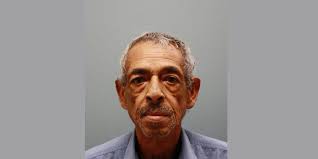
A Texas attorney has been accused of using work-related visits to a county jail to smuggle in legal paperwork laced with ecstasy and synthetic marijuana to inmates over the past several months, authorities announced Monday.
Ronald Lewis, 77, was arrested on Friday after arriving at the Harris County Jail in Houston to visit an inmate, Harris County Sheriff Ed Gonzalez said at a news conference.
During his arrest, Lewis had 11 sheets of paper believed to be laced with narcotics, according to authorities.
Lewis has been charged with two counts of bringing a prohibited substance into a correctional facility. He is free after posting bonds totaling $15,000. An attorney for Lewis did not immediately return a call seeking comment on Monday. Records with the State Bar of Texas show that Lewis has been a licensed attorney since 1982.
His arrest came after a monthslong investigation by the jail-based Criminal Investigations and Security Division, a new unit created earlier this year to probe an increase in drug overdoses at what is the largest county jail in Texas, Gonzalez said.
Investigators received tips that led them to Lewis.
Authorities allege that from July until this month, Lewis visited 14 inmates at the jail and he provided them with sheets of drug-laced papers, which were disguised as legal mail or other legal documents, Wheeler said.
Lewis was paid from $250 to $500 per transaction to smuggle in the papers, authorities said.
During the investigation, approximately 154 sheets of paper believed to be laced with narcotics were confiscated, Wheeler said.
“We’re currently working with the Texas Rangers to determine if any of the narcotics introduced in the jail by Mr. Lewis contributed to the death of any inmate,” Wheeler said.
Other attorneys are also suspected of smuggling drug-laced paperwork into the jail but “we don’t think it’s actually widespread,” Gonzalez said.
“There’s incredible attorneys out there that uphold their oaths and work very hard to take care of their clients and make sure that they’re representing them effectively,” Gonzalez said. “There’s always going to be those that choose illegal ways of doing things … and if they are, it doesn’t matter who they are. We’re going to make sure we investigate it fully and hold them accountable.”
Gonzalez said the county jail is like others around the country that have seen an increase in overdoses. The county jail has had at least 18 inmate deaths this year, some of them believed to be drug-related.
To restrict the flow of illegal drugs into the jail, the sheriff’s office is transitioning to a new system that will digitize inmate documents, including legal paperwork and letters.
“We’re going to continue to raise the bar and do everything we can to make sure that we’re keeping a safe facility, as safe as possible,” Gonzalez said.







